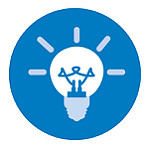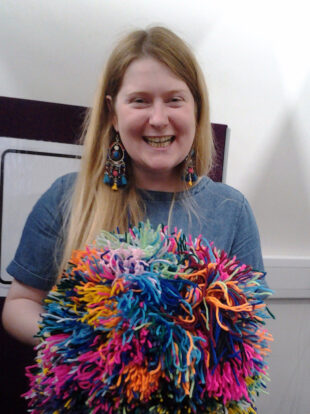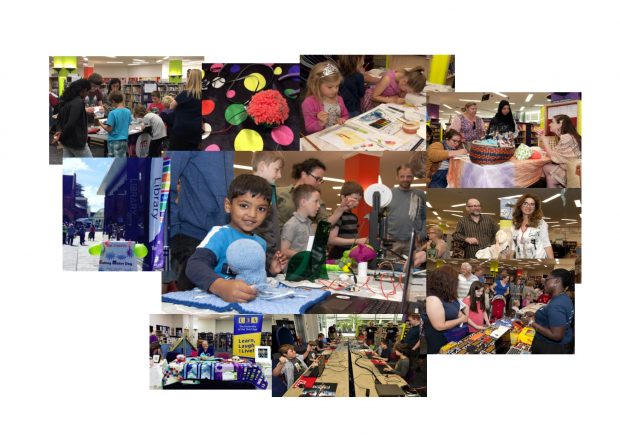

[Editor’s note: Guest post written by Helen Leech, Senior Manager, Digital Services at Surrey Library Service]
How our Makerday started
I’m writing from Surrey Library Service, a large authority with 54 libraries serving a population of 1.1m. We started running digital-themed events in July 2015. By March 2016, we had some experience under our belts, had built an audience and had made some useful relationships including with Carlos Izsak . So we became more ambitious; we copied West Sussex libraries and ran a Geek Week. We learnt a lot from this in terms what worked and what didn’t. We learnt that you need to have a target audience in mind and time the event carefully to work around school terms and family commitments, and the most popular events were the ones where people got hands-on.
We used our Geek Week to build our mailing list and to start recruiting a body of volunteers. More importantly, it brought us fresh relationships, including Keith Robson, the Director of the 5G innovation Centre at the University of Surrey who became a staunch supporter, our local County Councillor: Mark Brett Warburton, who found us some small pots of money, and Marieme Jamme, founder of IamtheCODE, a programme which supports girls and women to become tech entrepreneurs. Marieme now donates the kit and expertise for us to run IamtheCODE clubs for children and women at Guildford library, based on Kano computers, programming and Littlebits electronics.
Our plans develop further
Rose Wilson, the Library Service’s Lead Manager, asked if we could run another Geek Week at another library; partly to extend the digital programme, and partly to embed the concept of SCL’s Code Green into other libraries. Coincidentally, at the same time, one of the library managers at Woking approached me to ask if she could do something at her library. Surrey is an authority with no cities and consequently no hyper-libraries; Woking is our busiest, and she wanted to see how digital events could enhance the offer.
We wondered whether to do a mini-Makerfaire, an international concept which brings a brand, a plan and a body of marketing, but the licence costs alone (£800) precluded it. Fortunately, Carlos and I got invited to speak at the Cracking the Code event held by the Society of Chief Librarians in Manchester, and I met Denise Jones from Liverpool Libraries, where they have successfully (and cheaply) run three makerdays. I pinned her into a corner and she very kindly told me how she and her colleagues had planned and delivered their events. There’s no way we could emulate Liverpool festival’s size and success, but it made us realise it was a feasible thing for us to plan. On Sunday 4 June 2017, we delivered our own makerday at Woking Library: 17 exhibitors and 500 attendees, in a library which is normally closed on Sundays.
We had a better idea of who we were trying to serve, and what we were trying to do, than we had during our Geek Week. We wanted to do 3 things through the Makerday:
- Encourage people of all ages to get involved in innovation and creativity
- Make new relationships which will allow us to deliver more digital-themed events at Woking, and
- Recruit volunteers in order to start an IamtheCODE club.
We put together a small working party consisting largely of frontline staff, who proved to have a mix of skills that were nearly perfect for the project. We co-opted two more to fill skill gaps. It proved impossible to get everybody together for meetings, but we saw enough of each other to keep the momentum going. One person took control of the library logistics, another promotion, a third wrangled the exhibitors, another the volunteers. We started planning it six months in advance, and spent the first couple of months advertising for exhibitors. We ended up with a pleasing mix of the old and the new: quilters and 3D printers, sculpture and Minecraft, watercolours and LED electronics, and a wonderful startup called SNOG, which melds the old and new by teaching people to make woolly pompoms that flash lights and play music: the nicest way to learn to solder imaginable.

Publicity and logistics
To recruit exhibitors, we used our library e-newsletter, our social media accounts (Twitter and Facebook), the usual poster in the library, and personal relationships. Our list of exhibitors built slowly over time and was horribly fluid, changing up to the last minute. One exhibitor pulled out the day before the event. They’re a successful but very small startup making robotics kits for children, and were called to a meeting in Amsterdam which made it impossible to attend. Another company never turned up at all, and at time of writing I still haven’t found out why.
As for the public, we decided not to charge, and to ticket the event, limiting it to 500 attendees. We ticketed because we wanted to know that people were coming, and so we set up an Eventbrite where we could see how ticket “sales” were doing. We weren’t sure how to promote it, apart from the usual library routes. We tried a Facebook advert which worked but was expensive – each ticket “sold” cost about 80p, so we stopped after a quick experiment. What really worked was emailing all the Woking library members, something we can easily do using our County Council email system. (It’s worth noting that our Data Protection register entry permits us to do this). It worked astonishingly quickly. Within minutes of my colleague starting to send out the emails – at about 11am on a Thursday morning – the tickets started to move; by 11pm the same day, I sat watching the last handful go. 350 tickets “sold” within twelve hours (150 others had already gone via other routes, including Facebook).
And the day itself?
The Makerday itself went really well. We borrowed 30 tables and 20 extension flexes from the HG Wells conference centre a couple of blocks away (thank you, Woking Borough Council) and set them up the night before. The exhibitors started arriving at 9.30 and at 11am we opened. We had around 7 staff who spent the whole day there, and then a number of other staff and volunteers who came and spent a couple of hours. The setting up and closing down periods were the times when we needed people; in the middle there wasn’t a great deal for us to do, apart from tweet and take photos and Periscope, and chaperone the Mayor. Three of the exhibitors ran charged workshops, which added a bit of substance to the day. The doors closed at 3pm, and by 3.40 all the exhibitors were out; by 4pm the library was empty.

Statistics:
- 534 attendees (note - the 500 figure mentioned above was because we wanted to be sure people were planning to come. Knowing that around 20% drop out was normal for free events, we were then able to release more tickets as the date arrived)
- 17 exhibitors
- 3 workshops
- Cost (excluding the hidden staffing and building costs): £270, of which £190 was rubber mats to cover extension flexes
- 42 children signed up for a future IamtheCODE club
- 12 volunteers signed up to run the club
Exhibitor comments:
“Please think of us if you run something like this again” – Club Minecraft
“It was very well attended and everyone looked to be enjoying themselves. If you decide to run it again, then I'd love to be a part of it again.” - Makecreatecraft
Attendee comments:
“Brilliant experience. Both my kids and I enjoyed the workshops.”
“I liked the coding the most. So awesome” Eva 6
“Great. At other libraries please.”
“Please do it again - we had 3 generations of our family (grandparents, parents and children) and all had a great time learning about making - U3A and tech great combination”
“Really excellent. Lots of exciting things for adults and kids. Lots of very helpful stallholders. Hope you have another event soon!”
What next?
We intend to start IamtheCODE clubs at Woking and at 3 other libraries. We also want to use the relationships we’ve made to organise more digital-themed events, where we offer the space and marketing for local clubs and companies to come in and do things that enhance and complement our traditional offer of reading, information, learning.
We need a structured offer. We have the IamtheCODE curriculum which gives us a start, letting children try out a range of technologies and learn coding, but we need more structure for both children and adults. We want programmes that don’t just inspire people, but which mark out paths that help young people into employment and older people into new interests. I’m hoping that Carlos Izsak and Kate Lomax of Artefacto will come up with programmes that we can use.
And, finally, we held a get-together of like-minded digitally-enthusiastic librarians from across the South East last year and learnt a lot from this, so we’ll be doing the same this year, to share our experiences and learning. If you are interested in taking part, please email me directly: Helen.leech@surreycc.gov.uk
To keep up to date with activities in Woking library, follow us on Twitter or Facebook, or for Surrey libraries more widely, on Twitter.
UPDATE: Makerdays, MakeFests, announcements about Fun Palaces 2017, and other creative collaborations, we have clearly tapped into a popular theme with this post. We'll feature a post from the team in Liverpool shortly - but if other libraries are planning or have run events, please get in touch - we'd be happy to feature more posts to share experiences and ideas.
---------------------------------------------------------------------------------------------------
Please note, this is a guest blog. Views expressed here do not necessarily represent the views of DCMS or the Libraries Taskforce